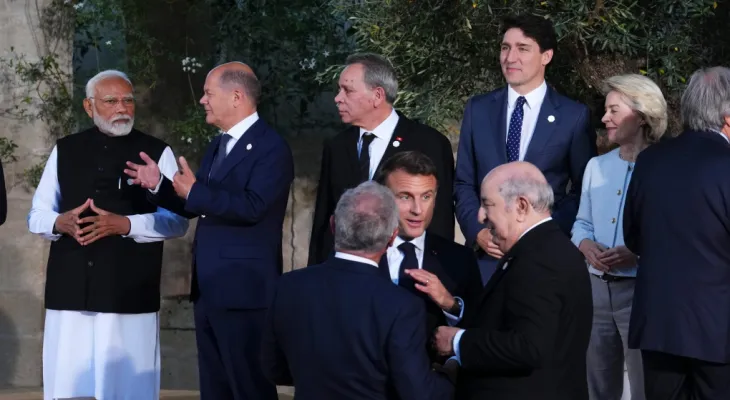Search here
Newspaper
Search here

Arab Canada News
News

Published: June 15, 2024
Leaders of the G7 countries expressed greater concern than ever about foreign interference and plan to establish a "collective response framework" to address foreign threats to democracies.
This commitment is part of a 43-page statement issued by the leaders of Canada, the United States, the United Kingdom, Italy, France, Germany, and Japan on Friday.
It was said that government ministers were asked to put the framework together by the end of the year, which will include public disclosure of "foreign operations to manipulate information."
The statement also called on technology companies to intensify their efforts to prevent and counter foreign interference and information manipulation, particularly through the misuse of artificial intelligence.
The focus on foreign interference and its threats to democracy comes at a time when Prime Minister Justin Trudeau's government has been embroiled in controversy over allegations that foreign countries, including China and India, attempted to interfere in the recent federal elections.
Concerns regarding artificial intelligence follow a warning about this technology from Pope Francis, who became the first pope to address G7 leaders on Friday.
The pope advised the leaders to keep humanity focused on the development of artificial intelligence and to ensure that decisions regarding when to use weapons or even less lethal tools are always made by humans and not machines.
Francis said: "We would judge humanity to have a hopeless future if we deprived people of their ability to make decisions about themselves and their lives, by condemning them to rely on the choices of machines."
"We need to ensure and protect a space for appropriate human control over the choices made by artificial intelligence programs: human dignity itself depends on that."
Trudeau met with the pope before his speech on Friday afternoon and discussed with him the need to enhance reconciliation and the call for the return of Indigenous artifacts in the Vatican Museum.
Leaders of various countries, who arrived at the summit on Friday, also attended the pope's speech. Among them were Turkish President Recep Tayyip Erdoğan, Argentine President Javier Milei, and Indian Prime Minister Narendra Modi.
After Modi posted a picture of himself shaking hands with Trudeau on social media, the Prime Minister's office said the duo had "a brief discussion about bilateral relations."
Spokesperson Anne Clara Vailancourt said Trudeau also congratulated Modi on his re-election.
Vailancourt said, "Of course, there are significant issues between our two countries at this time. You can appreciate that we will not be making any further statements at this time."
This was the first time the two met in person since Trudeau accused Modi's government of being involved in the murder of Sikh activist Hardeep Singh Nijjar in British Columbia.
Trudeau made this shocking revelation in the House of Commons last September. Since then, four Indian citizens have been arrested and charged with the murder of the carpenter.
The first day of the G7 summit in Puglia, Italy, was dominated by news that the leaders would provide a $50 billion loan to Ukraine using profits earned from frozen Russian central bank assets as collateral.
Canada promised on Thursday to provide up to $5 billion to finance the loan.
The statement issued on Friday read, "We reaffirm our steadfast support for Ukraine no matter how long it takes." It added, "Together with our international partners, we are determined to continue providing military, budgetary, humanitarian, and reconstruction support to Ukraine and its people."
The conflict in the Middle East prominently featured in the leaders’ final statement, despite no major promise of new action from the G7.
The statement endorsed a ceasefire agreement outlined by U.S. President Joe Biden and called on Hamas to fully accept the proposal while also urging more humanitarian aid to be delivered to civilians.
The leaders also expressed their desire to establish "constructive and stable" relations with China, while urging Beijing "to refrain from adopting export control measures, particularly with respect to critical minerals, which could lead to major disruptions in the global supply chain."
On this front, the statement insisted that G7 countries "are not isolating or closing themselves off. We are working to mitigate risks and diversify supply chains wherever necessary and appropriate, enhancing the ability to counter economic coercion."
Italian news agency ANSA reported on Thursday that Italian negotiators succeeded in removing the word "abortion" from a previous draft of the statement.
However, the final version included a commitment to good healthcare for women, including "comprehensive sexual and reproductive health and rights," and a pledge to "unleash" at least $20 billion over three years to promote women's empowerment.
Canada's contribution to those initiatives is $120 million.
An additional $200 million will be allocated to the International Fund for Agricultural Development.
Immigration was another priority for the host country, Italy, and its right-wing government, which wanted to increase investment and funding for African countries as a means to reduce migration pressure on Europe.
A G7 coalition was launched to prevent and combat the smuggling of migrants.
Comments